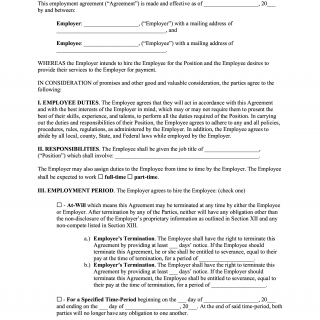Part-Time Employment Contract
A part-time contract is a legal agreement between an employer and an employee that outlines the terms and conditions of employment for part-time work. The main purpose of this form is to establish a clear understanding of the expectations and responsibilities of both parties.
The contract typically consists of several important fields, including the names of the employer and employee, the start date of employment, the job title and description, the hourly rate of pay, the hours worked per week, and the duration of the contract. It may also include information about holiday entitlement, sick leave, and other benefits.
When writing a part-time contract, it is important to consider the needs and expectations of both parties. Employers should ensure that the terms of the contract comply with all relevant employment laws and regulations. Employees should carefully review the contract to ensure that they understand their rights and responsibilities.
Documents that may need to be attached to the contract include proof of identification, proof of eligibility to work, and tax forms.
Examples of when a part-time contract may be required include hiring a part-time employee for a specific project or to cover a temporary staff shortage.
Strengths of a part-time contract include clear expectations and responsibilities for both parties, and protection for both the employer and employee in case of disputes. Weaknesses may include the potential for misunderstandings or disagreements over the terms of the contract. Opportunities to improve the contract may include adding additional benefits or clarifying certain terms. Threats may include changes in employment laws or regulations that could impact the terms of the contract.
Alternative forms or analogues to a part-time contract may include temporary contracts, casual contracts, or freelance agreements. The main difference between these forms is the duration and nature of the work.
The part-time contract affects the future of the participants by establishing clear expectations and responsibilities. It can help to build trust and foster a positive working relationship between the employer and employee.
The form/letter is typically submitted to the employer for review and signing. It should be stored in a safe and secure location for future reference.

